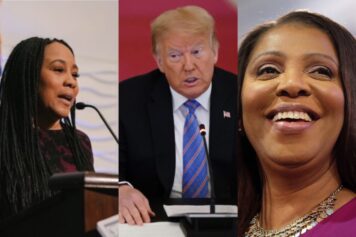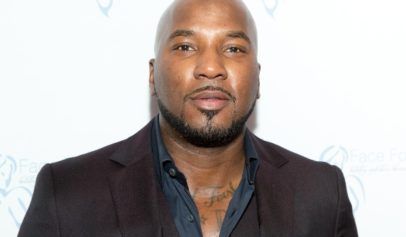
Protesters and counter-protesters face off at the alt-right’s “Unite the Right” rally in Charlottesville, Va., on Aug. 12, 2017. (www.sywix.net)
There were dueling narratives surrounding the 2016 presidential election. On one side, sat a set of voters, scholars and pundits that argued for a Clinton presidency on the merits that the former first lady, senator and secretary of state would continue the policies of the next president’s immediate predecessor, Barack Obama.
On the other, a more radical or progressive set that argued that Clinton and her rival, Donald Trump were the “same thing.” The Clinton campaign and candidacy, flawed as it may have been, was plagued by email scandals, decades-old comments about children being “super predators” and the behavior of the former President Clinton. All hung like an albatross around the campaign’s neck.
During the Democratic primary campaign against Vermont Sen. Bernie Sanders, legal scholar Michelle Alexander argued that Clinton didn’t deserve the Black vote. In an oped piece for The Nation, “The New Jim Crow” author wrote:
“If you listen closely here, you’ll notice that Hillary Clinton is still singing the same old tune in a slightly different key. She is arguing that we ought not be seduced by Bernie’s rhetoric because we must be ‘pragmatic,’ ‘face political realities,’ and not get tempted to believe that we can fight for economic justice and win. When politicians start telling you that it is ‘unrealistic’ to support candidates who want to build a movement for greater equality, fair wages, universal healthcare, and an end to corporate control of our political system, it’s probably best to leave the room.”
Others went a step further, arguing that the eventual Trump presidency would be good for the movement. In an appearance on the syndicated radio show The Breakfast Club, Dr. Marc Lamont Hill stated, “I would rather have Trump be president for four years and build a real left-wing movement that can get us what we deserve as a people, than to let Hillary be president and we stay locked in the same space where we don’t get what we want.”
Despite Clinton prepping the release of an autobiographical autopsy on what went wrong, there’s little need for us to examine how we got here. Those who would rather have a President Trump in the name of movement building will get to test their theories in real time.
It’s also worth noting that the Clinton loss cannot, and should not be laid at the feet of Black voters, as Daily Kos founder Markos asserted when tweeted Trump’s actions are “what happens when communities of color don’t vote.” Clinton won the Black vote by an overwhelming margin, taking 93 percent of Black women and 88 percent of the overall Black vote, according to exit polls. While it is true that Clinton failed to run up the score among Black voters, and younger Black voters in terms of turnout, it was white America that delivered the presidency to Donald Trump, including 53 percent of white women.
As younger voters age and become a larger part of the electorate, one looming question remains: Was sitting out the election, voting third party or hoping for a new movement to emerge to counter a Trump administration worth the damage the Black community endures in the interim?
Just seven months into Trump’s administration and signs of lasting damage have already occurred. Under Attorney General Jeff Sessions, the Department of Justice is beginning a “review” of consent decrees with 14 police departments, including Ferguson, New Orleans and Cleveland. Given the administration’s bold and uncompromising support for law enforcement, and blatant endorsements for police brutality from the president himself, rescinding the consent decrees threatens to undo years of work by local activists in those communities. In addition the President recently reversed a prior executive order, now allowing military hardware to freely flow into the hands of local law enforcement. The DOJ has also vowed to look into affirmative action policies at colleges and universities.
The damage doesn’t end there.
Trump’s Department of Education, headed by controversial school choice advocate Betsy DeVos, is under fire from more than a dozen state attorneys general for attempting to undo protections for students with federal loans cheated by their colleges or universities. HUD, the agency responsible for setting and enforcing housing policy, has undergone deep cuts affecting both budget ad personnel, according to an investigative report by The New Yorker and Pro Publica. So decimated are the ranks that the agency headquarters’ cafeteria now sits vacant.
The president’s lasting legacy will be felt on the bench. More than 100 judicial vacancies existed when Trump took office. Filling all, or even most of those seats with conservative judges hostile to civil rights and the issues communities of color mean an uphill battle on the legal issues that will persist long after this administration is swept into the dustbin of history. Politico notes Trump’s initial slate of nominees “represent not only a sharp turn out of the mainstream but a major setback for judicial diversity,” including three nominations to replace outgoing African-American judges with white men.
On a surface level, Trump’s ascent to the White House unquestionably gave birth to a new rise of blatant white supremacy. Dubbed the “alt-right,” figureheads like Richard Spencer attempt to couch their bigotry in intellectualism, diverging from yesteryear when groups like the Ku Klux Klan used hoods, horses and burning crosses to terrorize communities of color. The more fashionable and well-spoken brand of white supremacy don’t make the new crop any less dangerous, as we saw in Charlottesville when one white supremacist drove his car into a crowd of counter protesters, killing one woman and injuring more than a dozen others.
The time for thought experiments is over. Those who theoretically grappled with the idea of building a new movement of leftists or a mass exodus from the Democratic Party have the opportunity to put those ideas into action. Movement and party building take time, talent and treasure. Whether the solution is to build a viable third party or orchestrate takeovers of segments of the Democratic Party, not being politically active and taking our ball and going home when our desired outcome isn’t achieved is no longer a tenable position.
There is a time for arguing and a time for unity. But let us not argue so much over the next three and a half years that we get Trump for an additional four. If the past seven months are an indication, that is truly a cost too high to pay.
AJ Springer is a writer, communications pro, nerd and nomad. You can find him on Twitter @JustAnt1914 discussing current events, combat sports, pop culture and the finer points of pro wrestling. He makes his home in Washington, D.C.


